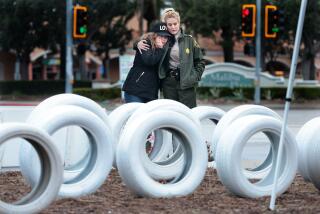Work Begins on Toll Lanes Along Riverside Freeway
- Share via
ANAHEIM — Gov. Pete Wilson, attending the groundbreaking in Orange County of the nation’s first privately owned and operated toll lanes in 50 years, called for expansion of the private road concept throughout the state.
“We will continue to seek partners for similar projects,” Wilson said at a sand-and-shovel ceremony in Yorba Regional Park, alongside the crowded 91 Riverside Freeway. Construction began late Tuesday for two toll lanes in each direction on the 10-mile dirt median on the Riverside Freeway between the Riverside County line and the Costa Mesa Freeway.
“This is the beginning of what is not lightly described as an historic project,” Wilson told a crowd of dignitaries under a banner that proclaimed, “New Roads, No Tax Dollars, New Jobs.”
The express lanes will be constructed and operated by a limited partnership known as California Private Transportation Co., headed by Omaha-based Peter Kiewit Sons’ Inc. The lanes will also incorporate the world’s first totally automated tollway for regular commuters, according to state and federal officials.
One consultant predicted that the company would make money “hand over fist” from its estimated $125-million investment. Authorized through state legislation in 1989 as one of four experimental private toll-road projects, the California Private Transportation Co. received a 35-year franchise to build and operate the road. It is expected to open to traffic in 1995.
Under the contract, the transportation company uses bank loans and funds invested by its partners to build the toll lanes. Its partners include Kiewit, the Cofiroute Corp., based in France, and Granite Construction Inc., based in Watsonville, Calif. The Orange County Transportation Authority has provided $6 million, which must be repaid.
The taxpayers’ only involvement, besides limited Caltrans review of the plans, is to provide the median strip as a free right of way.
In return for building and operating the toll lanes, the firm is entitled to collect and keep the tolls during the 35-year franchise, which begins when the tollway opens. When the franchise expires, the road becomes the property of Caltrans. During the life of the franchise, California Private Transportation Co. will reimburse the state for Highway Patrol and maintenance expenses.
In applauding the concept of private toll roads, Wilson said the Orange County project “will create jobs in the private sector. It will ease the strain on what is one of our most congested highways. And it will do this at no cost to the taxpayers.”
Gerald Pfeffer, the firm’s managing director, said Tuesday that he is confident the Riverside Freeway project will earn a profit, but he declined to estimate the rate of return on investment.
“There are more than 250,000 cars per day going through the interchange with the Costa Mesa Freeway,” Pfeffer said. “Traffic forecasts for the year 2010 range up to 400,000. We think this project has great potential financially.”
Motorists who use the lanes on a regular basis will deposit money into a credit account that will be charged after each trip. Transponders on each vehicle will communicate with roadside scanners connected to a computer system. Designers are still discussing how to bill occasional users. License plates also will be photographed to catch freeloaders.
Tolls will be $2 each way during peak traffic hours, but passage will be free to cars carrying three or more people, motorcycles, disabled veterans and other disabled travelers with special state license plates, as well as electrically powered or “zero-emission vehicles.”
The project is expected to create 150 temporary construction jobs and 180 permanent positions.
More to Read
Sign up for Essential California
The most important California stories and recommendations in your inbox every morning.
You may occasionally receive promotional content from the Los Angeles Times.













